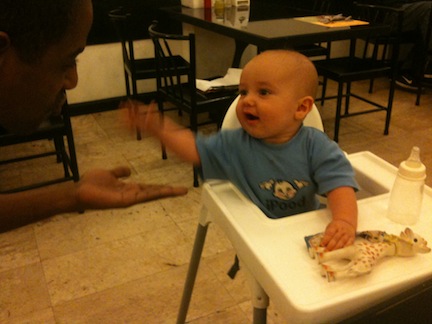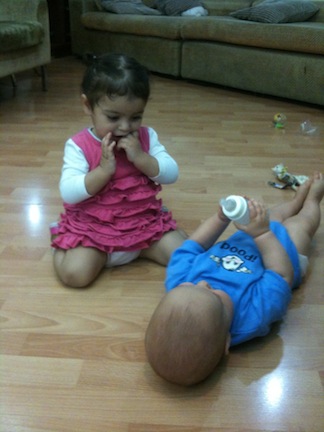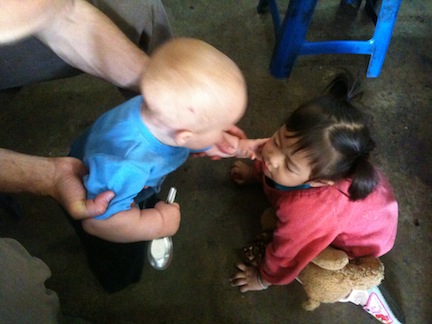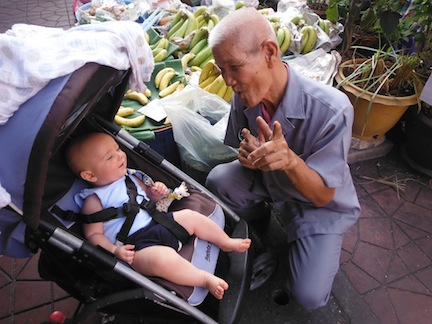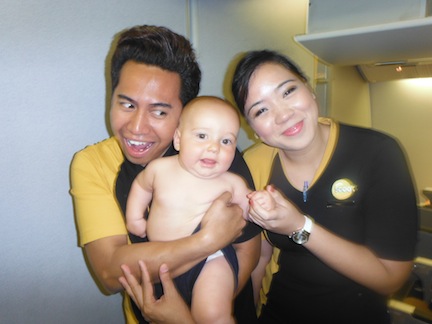Traveling & Backpacking with a Baby or Infant: Top 10 Reasons for your Baby to Play with the Locals (Part 3 – Mental & Emotional Benefits for Baby)
The last couple of days, I have been posting my top 10 reasons to allow your baby to play with local adults and children as you backpack or travel through a foreign country. We’ve already gone through the benefits for mom and dad (and there are benefits for us parents, too!) and the physical benefits your baby receives. Today I’ll go through the last four points in my top ten: the mental, intellectual, and emotional benefits to your baby.
So with no further ado, here are the last four in my top ten reasons for your baby to play with the locals as you travel or backpack:
4. Play teaches impulse control
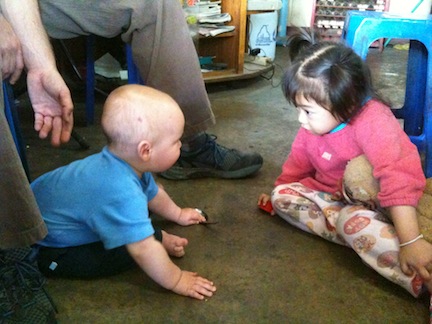
Akiva and a curious Thai girl get to know one another. What ensued was a little "dance" back and forth as each tried to figure out how best to approach the other, whether through touching, speech, or simply eye contact.
Another social benefit of allowing your baby to play with the locals as you go is that she will learn better impulse control. Self-regulation is hard work for a baby, who is used to having the world revolve around them and mommy and daddy respond to every whim. But playing with others means social rules and limits are automatically imposed. The exact rules of the game, might change slightly in every culture, but the skill learned will always be the same: control yourself. More time spent playing means a less impulsive child, teenager, and eventually adult.
3. Play helps your baby’s social development
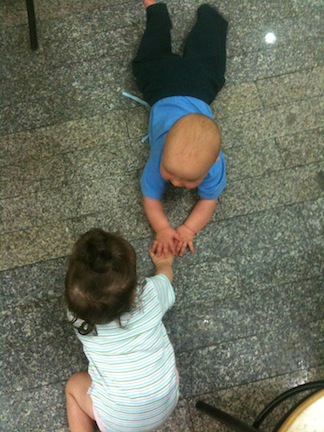
Akiva holds hands with an Israeli girl. Through this kind of contact, both babies learn appropriate social boundaries, such as what kind of touch is appropriate (at this stage, that mostly means 'painless'), thereby improving their social skills.
Playing with others helps your child learn important skills of social interaction. She’ll learn how to relate to others on a basic level, which transcends cultural boundaries. In every culture, babies and children need to learn skills like taking turns, sharing, and working together. They also learn skills like empathy – no matter where in the world you are, your baby can still learn to notice another child’s feelings and responses. These skills are crucial for their social development and the skills they gain now they will have later in life as well. Kids that play better together become better collaborators and team players as adults – skills that will benefit your child all through her life.
There are other social benefits, too. Play allows your child to learn how to express her emotions – both positive and negative – in a safe, creative space. However, children find it most difficult to learn how to express the negative feelings – which are often the most powerful – and play gives them an outlet for these. Playing with toys or role-playing with another little one gives them a chance to get it all out.
2. Play will make your baby smarter
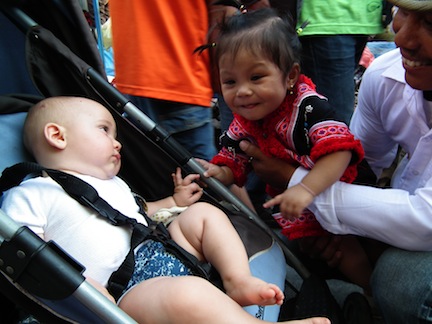
Akiva stares at a native Thai village girl who wants to play with him. Babies are constantly observing and learning, and picking up on new details and information as they play with others.
Your baby’s brain is still growing and developing. New cells are being formed and new links created every single day. Why not provide those links with some stimulation? Forming strong links between new brain cells ensures they stay active, improving your baby’s intelligence and memory. Babies learn faster and form stronger links and associations by actual physical play than by watching television or a DVD. Also, we know that as adults we learn better when we teach a skill to someone else – so why not let your baby “teach” new skills and ideas to a new friend?
Attention span and concentration are specific skills controlled by a certain area of the brain. In today’s world of immediate gratification, constant entertainment, and ceaseless change, these areas of the brain don’t get as much stimulation and encouragement as they ought to. However, you can encourage your baby to build these parts of her brain by giving her something to focus on that she won’t want to look away from: playing with new friends.
And… the number one reason to let your baby play with locals is…
1. Play with locals will improve your baby’s language and literacy
Babies all over the world are what I like to describe as ‘citizens of the world.’ They can discriminate all the sounds of all languages, no matter what country we’re testing and what language we’re using.
— Patricia Kuhl
Language has a critical period for learning, which means that you and I, as adults, will have a more difficult time learning new languages. (Rabbi Ben disagrees with this, but the scientific studies disagree with him.) In fact, we as adults cannot even always distinguish all the sounds in all the languages – but babies can. Children learn language best before the age of 7, so by exposing your child(ren) to native speakers of foreign languages, you’re giving them the opportunity to learn language more easily.
And for anyone thinking of traveling with a baby and saying to themselves, “but my baby can’t even talk yet!” – don’t let this be a reason not to travel. In fact, if you’re traveling with a baby, this is the best and most important time to let your baby play with locals – especially adults. That’s because between 6 and 12 months of age – and especially between the ages of 8 and 10 months – baby brains are being wired for language. This is the age when they learn to distinguish sounds. It’s when they learn to tell the differences between tones in language, or between “R” and “L” sounds, for example.
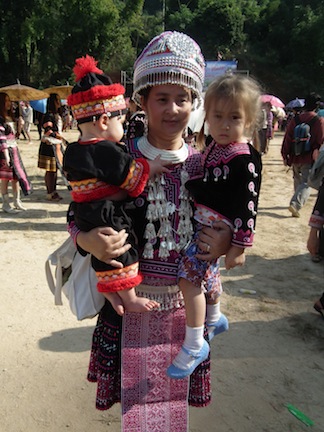
Eight-month-old Akiva makes friends with some Hmong hill tribe natives of Thailand. Although he has had a lot of exposure recently to Thai speakers, exposure to speakers of the Hmong language will help him to form new pathways in his brain that will enable him to hear and recognize more language sounds as he grows older.
Now, if you think you’ll teach your baby these same language skills using Baby Einstein, think again. Studies show that a baby who watches TV in a foreign language or listens to audio cassettes in a foreign language does not learn the sounds in that foreign language at all. It takes a human being to play with and talk to the baby in a language. So by allowing your baby to play with the locals as you travel, you are actually allowing them to rewire their brains for a second language. What an advantage to give your youngster!
And if that doesn’t convince you to let your baby play with the locals as you travel, think about this: Babies who engage in (especially sociodramatic) play use more words, string together longer sentences, and apply more complexities to their speech. Additionally, by allowing your baby to play with others, rather than simply sitting him down in front of the iPad when you need a short break, leads to an increase in language skills (of 15%, according to studies – a significant amount). So if you weren’t convinced before, let your baby play with the locals!
Read More

